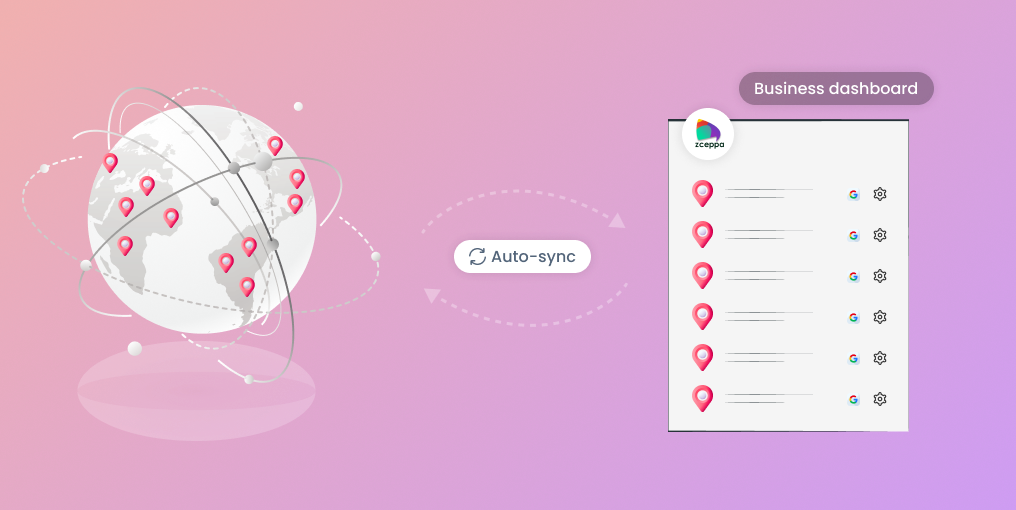Listings Management Made Easy for Healthcare, Finance, and Automotive

As businesses expand, one challenge looms larger than most: managing thousands of profiles and data points at scale.
How do large organizations with 1000s of locations and public-facing service providers locations, thousands of professionals, or even hundreds of service centers stay consistent across various platforms and search engines?
The answer lies in effective listings management and the ability to synchronize data seamlessly across multiple networks and platforms—internal systems or external, consumer-facing channels.
The Hard Truth?
Business listings receive 2.7x more views than a brand’s owned website (including local store pages and directories).
From ensuring accurate location data to keeping operational hours and contact details up-to-date, listings management at scale becomes a key operational challenge—and a critical competitive advantage.
In this blog, we’ll delve into the complexities of listing management, focusing on three key verticals: healthcare, finance, and automobile.
Why Listings Management is Critical for Verticals like Healthcare, Finance, and Automotive
Listings Management is the process of ensuring that a business’s critical information—such as location, contact details, operating hours, and services offered, also called NAP —is accurate and consistently updated across various online platforms, directories, and search engines.
This ensures that customers can easily find the right information when searching for businesses or services. Let’s look at a few verticals where effective & efficient listing management is critical.
Healthcare
In the healthcare sector, listings management refers to the process of ensuring that every location and service within an organization has accurate, up-to-date, and accessible information across multiple online platforms.
This information may include the exact addresses of hospitals, outpatient centers, and specialty clinics, operating hours, contact information and types of services.
The data must remain consistent and up-to-date across various platforms like Google Business Profile, hospital websites, third-party healthcare directories (like Practo or Zocdoc), and even insurance provider networks.
Approximately 86% of people search for a business’s location on Google Maps, making it critical for brands to have updated online listings.
However, the challenge is that healthcare organizations are constantly evolving. Providers may move between facilities, change specialties, or adjust their availability based on new schedules. If these changes aren’t reflected promptly in online listings and internal systems, they can create significant friction between patients and providers.
Hence, practitioner listings are equally important, and this is where provider data management comes into play.
It takes listings management in healthcare a step further by ensuring that the facilities and individual healthcare providers have accurate, synchronized, and accessible data across all platforms.
Now let’s dive into why Accurate Listings Management Matters-
1. Accurate Provider Information
When patients search for healthcare providers, they often look for specific specialties or services.
For example, they might type in queries like “Best gynecologist in Chicago,” “Top pediatrician in my pincode,” or “Leading oncologist in Bangalore.”
These searches are usually driven by urgency and the desire for quality care. In these crucial moments, the accuracy of your hospital, department, or doctor listings plays a pivotal role in whether or not a potential patient chooses your facility.
In fact, 63% of consumers say they aren’t as likely to engage with a business if their listing has incorrect information.
Imagine a patient finding a highly recommended specialist, only to discover that the phone number listed is incorrect or the clinic’s location is outdated.
Such inaccuracies not only cause frustration but can also erode trust, leading patients to seek care elsewhere.
For healthcare providers, this could mean missed appointments, poor patient experiences, and, in some cases, even putting patients’ health and safety at risk if they arrive at the wrong facility during an emergency. Once patients find a provider through their search, they often take immediate action, such as calling to book an appointment or requesting driving directions via their mobile devices.
Accurate contact details, particularly phone numbers, are critical at this stage. If a patient dials a wrong number or arrives at the wrong location, it results in lost opportunities for your facility.
Moreover, search engines favor listings with the most consistent and up-to-date information. This means healthcare facilities with accurate listings are more likely to appear at the top of search results, such as when someone searches for the “nearest clinic with emergency services.”.
By maintaining accurate and well-managed listings, your facility not only increases its visibility in local search results but also drives more inquiries and potentially boosts the number of appointments booked.
2. Improved Patient Access & Experience
One of the primary goals of accurate listing management and provider data management as an extension, is to enhance patient access to healthcare services. When patients have reliable and up-to-date information at their fingertips—such as office hours, addresses, and appointment availability—they are less likely to experience appointment scheduling errors or show up at the wrong time.
44% of people say they’ve visited closed locations due to inaccurate business hours.
Accurate listings minimize appointment cancellations, reduce unnecessary wait times, and help patients avoid the frustration of rescheduling. Moreover, patients can make informed decisions faster, improving their overall healthcare experience.
3. Effective Provider Matching
Effective listings management ensures that patients are accurately matched with the right healthcare providers based on their medical needs, location, and available specialties. This is particularly important for specialized care, where finding the right doctor can be the difference between receiving timely treatment and enduring long wait times.
For instance, a patient looking for a pediatric neurologist might mistakenly book with a general neurologist due to incorrect listings. Such mismatches lead to delayed treatments and patient dissatisfaction.
4. Streamlined Operations
Accurate provider data management doesn’t just benefit patients—it also helps healthcare organizations streamline their internal operations. Managing hundreds or even thousands of healthcare providers requires careful coordination of schedules, resources, and patient appointments.
When provider data is accurate, it becomes easier to allocate staff efficiently and ensure that healthcare professionals are properly utilized. This level of operational clarity reduces administrative burdens, cuts down on scheduling conflicts, and allows healthcare facilities to operate more smoothly. Inaccurate data, on the other hand, can cause scheduling chaos, resulting in unfilled appointment slots or double bookings, leading to revenue losses and resource inefficiencies.
Financial and Automobile Sector
Financial institutions, including banks, credit unions, and insurance providers, manage vast networks of branches, ATMs, and service centers.
Similar to healthcare, accurate listings management is essential for maintaining customer trust and operational efficiency. This includes streamlining listings like the precise location of bank branches, ATM locations, operating hours, service offerings, and contact information.
Furthermore, customers searching for specialized services like financial advisors, wealth managers, or investment products rely on accurate data to connect with the right professionals.
For example, an investor looking for a wealth management expert may end up contacting a general banking branch if listings aren’t clear, leading to inefficiencies and lost opportunities for both the customer and the institution.
The automotive sector is equally reliant on accurate listings management to remain competitive. Dealerships and service centers rely on up-to-date listings to attract and retain customers.
Key data includes the exact locations where customers can find new or used vehicles, location and contact information of service centres, operating hours, exact inventory information and customer reviews.
Why Listings Management is Important for the Financial and Automotive Sectors
46% of all Google searches are looking for local information. Consumers often search for specific terms like “car repair near me,” “auto dealerships open now,” or “best home loan providers” on platforms like Google, Yelp, Facebook, and Justdial.
Did You Know?
“Near me” or “close by” type searches, which primarily display listings in search engine results pages, grew by more than 900% over two years.
When businesses fail to provide accurate information—such as up-to-date addresses, phone numbers, or hours of operation—they risk missing out on potential customers. To capture this traffic, it’s crucial for businesses in the financial and automotive sectors to maintain accurate listings across all external platforms, not just their internal systems.
Let’s take a look at how effective listings management can help the financial and automotive sectors-
1. Customer Access
Financial Sector: Search queries like “ATM near me” reflect the high volume of local searches. Customers frequently seek immediate access to cash, especially during weekends and evenings. If a bank’s ATM information is outdated or incorrect, it can lead to frustration and lost customer engagement.
Automotive Sector: Similarly, queries such as “car dealership near me” see a surge during weekends when potential buyers are actively looking to visit dealerships. If a dealership’s location or operating hours are misrepresented, it risks losing foot traffic and potential sales.
2. Enhanced Trust
Financial Sector: Banks that regularly update their listings build trust with customers seeking services like loan consultations or account openings. Accurate information about hours of operation and service availability is crucial for customer satisfaction.
Automotive Sector: Dealerships that are transparent about their services and promptly address customer reviews enhance their online reputation. For example, a dealership showcasing positive feedback and updated service offerings is more likely to attract new customers.
Did You Know?
Accurate and reliable information means 66% of consumers are more likely to return.
3. Operational Efficiency
Financial Sector: Accurate listings reduce the chances of errors, ensuring all branches and ATMs provide consistent information. This efficiency leads to reduced operational costs and better service delivery.
Automotive Sector: Efficient management allows dealerships to organize services better. If a dealership keeps its service offerings up to date, it can manage customer appointments and inventory more effectively.
4. Data Management
Financial Sector: By tracking search metrics related to customer access, banks can adjust resources and strategies based on which branches receive the most traffic. For instance, if a certain location sees increased searches for “loan office near me,” the bank can allocate more resources to that branch.
Automotive Sector: Dealerships can analyze customer feedback and inventory levels through well-managed listings, enabling strategic planning and enhancing customer satisfaction.
How Does Zceppa Help with Managing Data at Scale?
Zceppa is a transformative solution for businesses navigating the complexities of listings management. Tailored for sectors that demand precision, such as healthcare, finance, and automotive, Zceppa leverages cutting-edge technology to ensure synchronized data across multiple platforms.
With a focus on scalability and automation, it helps simplify this otherwise complicated process, ensuring data accuracy and enhancing business visibility. Let’s take a look at some of its features-
1. Ace Local SEO and Rank on “Near Me” Searches
Zceppa Listings enhances local search visibility, ensuring that businesses appear in relevant local searches. By optimizing listings for keywords like “doctor near me,” “ATM near me” or “tire repair shop near me,” Zceppa helps organizations reach customers actively seeking their services. This feature significantly increases foot traffic and engagement, as potential customers are more likely to visit businesses that show up in their local search results.
A global multispecialty hospital saw inbound leads grow by 25% with Zceppa’s listings management. Access the case study to learn more.
2. Real-Time One-Click Data Synchronization
Zceppa’s real-time data synchronization ensures that any changes made—whether a hospital updates a doctor’s availability or a bank modifies its opening hours—are instantly reflected across all platforms, including Google and other directories. This capability eliminates the risk of outdated or incorrect information being presented to customers, fostering trust and improving user experience.
3. Multi-System Integration
Zceppa integrates seamlessly with existing internal systems such as Hospital Records Systems (HRS), Customer Relationship Management (CRM) tools, payroll, and inventory management systems. By pulling data from these internal sources and pushing it to external platforms, Zceppa streamlines data management, ensuring consistency and accuracy across the board. This integration reduces manual entry errors and saves valuable time for organizations.
4. Recommendation Engine
Zceppa includes a powerful recommendation engine that analyzes user behavior and preferences to suggest optimal listing strategies. By leveraging data analytics, organizations can make informed decisions about which services to promote or adjust based on customer demand, ensuring they remain competitive and relevant in their respective markets.
5. Alerts & Notifications
Zceppa employs a nudge-based architecture that keeps organizations informed about their listings 24/7. Users receive alerts about necessary updates, changes in regulations, or customer reviews, ensuring they stay proactive rather than reactive. This feature empowers businesses to maintain control over their data and respond quickly to any issues that may arise.
Good Read: How Zceppa’s Listing Management Achieved 60% Organic Lead Growth
Final Takeaway
Navigating the complexities of listings management is crucial for businesses today. Whether it’s managing provider data in healthcare, ensuring accurate branch locations in finance, or maintaining dealership and service center information in automotive- each of these sectors face challenges. Synchronized data not only fosters customer trust but also enhances operational efficiency across these industries.
Zceppa emerges as a powerful ally in addressing these challenges, simplifying the often complicated process of listings management. Its features—such as real-time data synchronization, multi-system integration, and robust automation—enable organizations to maintain up-to-date information effortlessly.
With tools designed to optimize local SEO and enhance visibility, Zceppa empowers businesses to remain agile, informed, and prepared to respond to the ever-changing landscape of consumer needs.
Sign up for a free trial and unlock the full potential of your business with Zceppa!
Signup for a free trial
Zceppa’s products empower your business to win every mobile-first consumer interaction across the buying journey.


